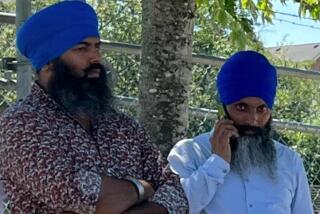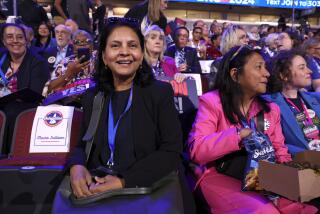Sikhs Stress the Positive at Cranston Fund-Raiser
- Share via
The gathering in Orange on Saturday night for Sen. Alan Cranston (D-Calif.) was “a lavish affair,” to quote one of the hosts. The men all wore sparkling clean turbans, the women were in colorful saris and Indian pajamas.
The group of more than 100 were among the more affluent of the Sikh community in Southern California, part of a minority religious group identified with terrorism and assassination in India, their homeland.
“When you heard this was a gathering of Sikhs, you thought, bombings, terrorists, right?” said Dr. Narindar Singh, an Orange physician, to a non-Sikh visitor. “Well, look around you. These all seem to be peaceful people to me.”
Two Sikhs in the personal guard of Prime Minister Indira Gandhi were identified as her assassins two years ago. Sikh terrorists are reportedly responsible for attempts on the life of the present prime minister, Rajiv Gandhi, last week.
It was a sore point for Sikhs who hosted Cranston at the home of Dr. Harmohinder S. Gogia on Saturday night that their religious group is identified with terrorism. They carefully stated their opposition to violence. But also, as Gogia said, “Fighting for oppression and fighting for justice is something we can understand.”
The purpose of the gathering in the upper-class Orange suburb was twofold: To show more involvement in the political process in America--$15,000 was raised for Cranston at the $100-a-plate backyard dinner--and to show Cranston, the media and other guests that the Sikhs have an unfair image as a violent people.
“We are Democrats, and we have been supporting California Democratic candidates for years,” Gogia said. “But we have never been organized before. We want to be more politically involved, to help both Sikhs here and in our homeland.”
Human Rights Issues
The Sikhs supported Cranston, Gogia said, because he was a leader in speaking out on human rights issues.
To impress Cranston with the group’s middle-of-the-road nature, one of the leaders asked over a loudspeaker how many in the audience were doctors. Nearly two dozen men and women raised their hands. Many others there were lawyers and engineers, or in real estate.
Nurturing that progressive image, several men pointed out to visitors their metal bracelets, which stand for equality between men and women. They did not want to be confused with other Asian or Middle Eastern religious groups whose women are treated as second-class citizens.
Hardeep Gogia, the doctor’s wife and hostess for the event, said the women in the group felt even more strongly about the bad public image that Sikhs have than do the men.
“We women are more sensitive to such things,” she said. “We want even more than the men for you to know how nice we are. We are not all terrorists.”
Sikh Was Congressman
The Gogias have been in the United States for 11 years and are American citizens. Gogia said all of the Sikh guests Saturday night were American citizens, many of them born in the United States.
A Sikh leader, the late Dilip S. Saundh, was a California congressman in the 1950s, they proudly pointed out. The group Saturday night was delighted to learn that Cranston had been a friend of Saundh’s.
Cranston told reporters he had accepted the Sikhs’ invitation because “I have some friends in this community and I’m trying to raise some money.”
Before sitting down to a dinner of curried lamb, clay-oven chicken and Indian cream spinach, Cranston spent most of his time listening to Sikh men and women tell him about the problems in India.
Sikhs make up just 2% of the India population, but are in the majority in the Punjab state in India, where some of the government skirmishes with Sikh terrorists have occurred. The Hindu-controlled government has oppressed the Sikhs, and is hurting their farms by diverting Punjab’s water supply to other Indian states.
Cranston listened politely, and later told them he identified with the problems of oppressed people all over the world.
“I know most Sikhs are not terrorists, as I know most Hindus are not,” Cranston said.
More to Read
Get the L.A. Times Politics newsletter
Deeply reported insights into legislation, politics and policy from Sacramento, Washington and beyond. In your inbox twice per week.
You may occasionally receive promotional content from the Los Angeles Times.









